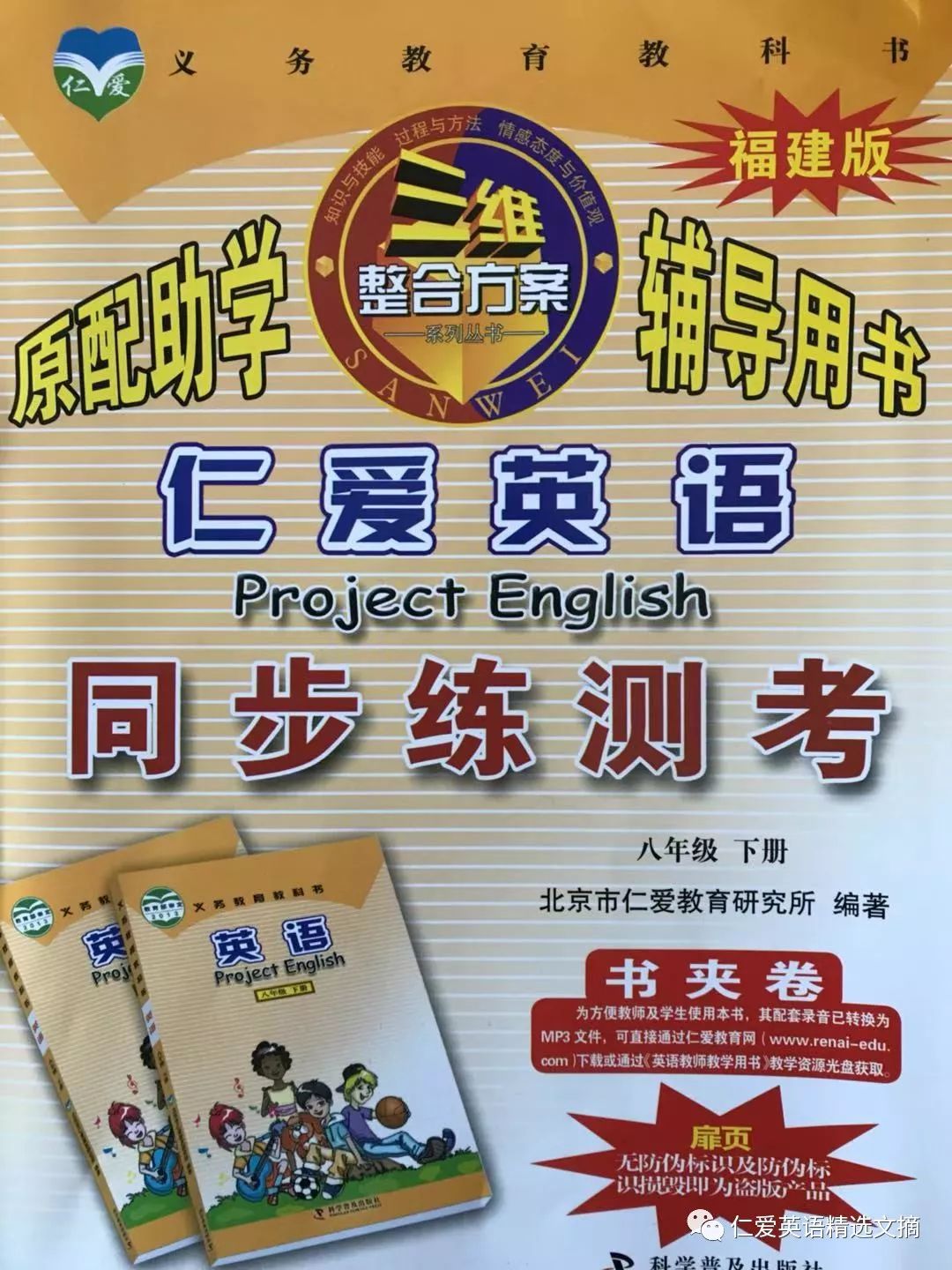八年级下册重点词汇短语句型
Unit5
一、重点词汇:invite, film, smell, seem, lonely, lively, almost,role,exam, strict, shy, fail, someone, feeling, joke,usual,either, accept, lovely, helpful, international,deal, elder,refuse, anyone, though, test, nervous, speech, rich,sick,proud, anyway, ready,passport,boss,grandson,environment, especially, fill, trouble, loud, noise,spirit,silent, decision, sense, fantastic, soft, fear,difficulty
二、目标短语:
invite to 邀请……去……
say thanks to sb.向某人道谢
a ticket to ……的票券
care for 照顾,照料
cheer up(使)振作起来
come into being 形成,成立
be full of 充满
make peace with sb.与某人和解
be popular with 受……欢迎
be strict with 对……严格要求
worry about 担心,担忧
take it easy 别紧张,别着急
at one’s age 在某人的年龄
tell jokes 讲笑话
with the help of 在……帮助下
be/ get used to (doing)sth.习惯于(做)某事
all the time 总是,一直
deal with 处理,解决
even though 即使,尽管
no longer/ not any longer 不再
give a speech 发表演讲
be in a bad mood 情绪不好
be proud of 以……自豪
give sb. a surprise 给某人一个惊喜
get ready for 为……做准备
fill with(使)装满,充满
be crowded with 挤满
think over 仔细考虑
make a decision做决定
三、重点句型
1.—How are you doing?
—Very well, thank you.
2. You look excited.
3.—He felt disappointed because he was not able to
buy a ticket to The Sound of Music.
—What a pity!
4. He seems a little unhappy.
5. It’s so funny and interesting.
6. We felt excited to hear it.
7.In China it used to be popular with old people while young people didn’t like it very much.
8. What seems to be the problem?
9.She feels very lonely because she has no friends to talk with.
10. Why don’tyou talk to someone when you feel sad?
11. Everyone gets these feelings at your age.
12. How time flies!
13. What’s more, I couldn’t sleep as well as usual.
14. The food was not as delicious as ours,either.
15. Please give my best wishes to your parents.
16. Is there anything wrong?
17. You see a snake lying on the road.
18.Think it over before making an important decision.
四、功能意念句型
1.高兴
I’m so happy!
That’s lovely/ great/ very exciting/ wonderful!
How wonderful/ nice!
It’s well done. I’mpleased to know that.
2.惊奇
Really?
Oh dear!
Is that so?
What a surprise!
How nice to see you!
How surprising!
I’m surprised!
Does that
What’s wrong?
What’sthe matter?
Anything wrong?
What should we do?
Are you worried about your health?
I’m worried.
4.安慰
There, there.
Don’t be afraid.
Don’ t worry.
It’s(quite) all right.
It’ll be OK/ all right.
Take it easy.
5.满意
Wow! Sounds great!
Good!
Well done!
It’s so exciting.
Perfect!
That’s fine.
That’s better.
That’s good enough.
I’m pleased with your spoken English.
6.遗憾
What a pity!
I’m so sorry!
It’s a great pity!
What a shame!
That’s too bad.
7.同情
I’m so sorry!
I’m sorry to hear that.
I’m so sorry about your illness.
I’m sorry to hear you are going away.
Please accept my deep sympathy.
8.恐惧
Help!
How terrible!
I’m afraid of that dog.
I’m frightened.
I’m afraid of taking bitter medicine.
五、语法项目
1.系动词+形容词结构。
2.由because引导的原因状语从句。
3.形容词的同级比较(as... as... , not as/ so... as...)。
4.简单句的六种基本句型。
Unit6
一、重点词汇:field, proper, price, total, pay, hotel, fridge,standard, single, condition, comfortable, raise,king,queen, common, Canadian, dollar, somebody, top,
receive, postcard, vacation, camp, north, east,west,wait, bicycle, tour, space, push, direction, step,beside, experience, everywhere, passenger, crazy,anywhere, pollution, advantage, careless, safety,truck, notice, empty, Asia, among, France, mile,central, winner explain, Europe, French, town,
village, slow, opposite, rush
二、目标短语
spring field trip 春游
find out 发现,查明
decide on sth.对某事做出决定
air conditioner 空调
a standard room with one single bed 单人标准间
raise money 筹钱
look forward to(doing) sth.期望(做)某事
hear from 收到……来信
prepare for 准备
on vacation 度假
work out 算出,制定,完成
in all directions 向四面八方
push out 推开,挤出
as soon as 一……就……
be famous for 以……著名
can’t help doing 禁不住做
be/ get used to 习惯于……
agree/ disagree with sb.同意(不同意)某人的观点
pay attention to 注意
in case of 如果,假使
look out 小心
三、重点句型:
1.Boys and girls, I have some exciting news to tell you!
2.We’re going on a three⁃day visit to Mount Tai.
3. What do you think your trip will be like?
4.It is very common to raise money in Canadian and American schools.
5.I’m looking forward to hearing from you.
6. The best way to raise money is to sell newspapers.
7.Why don’t we put on a show to raise money?
8.While you were enjoying your trip, I was busy preparing for my exams.
9. It’s about one and a half hours by bike.
10.He was too worried to think about what to do.
11.He didn’t//www.58yuanyou.com raise his head until someone called him.
12.While we were having fun exploring, I found that Darren was lost.
13.When I first arrived,I was afraid of riding my bike anywhere.
14. If we break the traffic rules, we may get a fine and even be in danger.
15.In case of an accident, bicycle riders should know how to give first aid.
六、功能意念句型
提醒注意
Don’t forget your raincoat.
Remember to lock the door.
Mind your head/ step!
No smoking!
No spitting!
Wet floor!
Look out!
Be careful!
It’s dangerous!
Don’t touch!
Don’t push!
No photos here!
五、语法项目
.动词不定式作定语、表语、宾语、宾语补足语、目的状语和主语等。
2.由while,after, before, as, when, until 和as soon as 引导的时间状语从句。
3. if 引导的条件状语从句。
Unit7
一、核心词汇
task, touch, success, imagine, soup, cookie, pancake,set, blind, western, Indian, African, Russian, address,regret, group, member, purpose, oil, add, noodle, bowl,quick, pear, piece, polite, fork, dish, spoon, chopstick,finger, southern, pick, lady, gentleman, sale, guest,menu, bill, corn, salad, lemon, bean, carrot, seat, job,worth, education, develop
二、目标短语
turn to sb.向某人求助
get in touch with(与……)取得联系
try one's best 尽最大努力
set the table 摆放餐具
have a sweet tooth 爱吃甜食
fight against 反抗,和……打架
as a result 结果
make a change 改变
in order to 为了
come true 变为现实,成为事实
cut up 切碎,剁碎
table manners 餐桌礼仪
drink to sb. / sth.为某人/ 某事干杯(或祝酒)
far away from 远离
pick up 捡起,获得,收拾
for sale 待售
pay the bill 结账
have a seat 请坐
in short 总之;简而言之
not only… but also … 不仅……而且……
三、重点句型
1.My task is to make a poster.
2. I will think about how to hold the food festival.
3. Let's try our best to make it a success.
4. That's good enough.
5. Thank you for inviting me to your food festival.
6. I regret that I cannot come.
7. But I'm not sure whether I can cook it well.
8.—Would you like me to help you?
—Yes, please.It's very kind of you.
9.Could you tell us how to make it?
10.—Would you mind if we learn to make it
from you?
—Of course not.
11. Practice makes perfect.
12. Help yourself to some soup.
13. Remember not to drink too much.
14.If you can't remember these rules, just do as
other people do.
15.—Do you know whether or not it's impolite to
smoke during a meal in France?
—Yes, I do.It's impolite.
四、功能意念句型
1.就餐
(1)—Would you like something to eat/ drink?
—Yes, I'd like some meat/ a cup of tea/ ...
(2)—What would you like (to have)?
—Rice and chicken, please.
(3)—May I take your order?
—Certainly. I'd like ...
(4)—May I have the bill,please?
—Let me see. It's ¥50.
—Here you are.
—Here's your change. Thanks for coming.
(5)—How much would you like?
—Just a little, please.
(6)—What would you like for breakfast?
—Eggs and milk.
(7)—Would you like some more fish?
—No, thanks. I'd had enough. / I'm full.
(8)—Help yourselves to some soup.
—Thank you. It's delicious.
(9)—May I have the menu, please?
—OK. Here it is.
(10)—Here is a table for two. Is it OK?
—Sure. We'll take it.
2.建议
Let's go and have a look.
What/ How about a picnic this Sunday?
Why don't you buy a computer?
Why not go to a movie?
You'd better take a camera.
You shouldn't miss Xishuangbanna.
3.顺序
What did you do next?
Finally we found the lost boy.
It rained even harder later on.
First, Second, Third, Fourth, Finally
First… Second … Next … Then … After that …
Finally …
五、语法项目
1.that,if/ whether 引导的宾语从句。
2.副词的比较级和最高级。
Unit8
一、核心词汇smooth, silk, handbag, afford, tie, sweater, scarf, blouse, sock, pocket, size, pretty, handsome, succeed, customer, simple, business, discuss, meaning, depend, survey, interview, enter, knee, text, reason, heat, airport, officer, patient, spread, daily, northern, similar, traditional, Asian, personal, express, above, list, choice, mix
二、目标短语
so … that 如此……以至于…… prepare for 准备
be made of 由……制成
protect…from…保护……不受……的侵害
easy⁃going 随和的
depend on 取决于;依靠
agree with sb.同意某人的观点
plain clothes 便衣
carry out 开展,执行
special task 特殊任务
stop sb.from doing sth.阻止某人做某事
on every occasion 在每个场合
take off 脱下,摘掉
in one's opinion 在某人看来
as well as 除……之外;也还
model the clothes 展示时装
minority costume 少数民族服装
stand for 代表
become known to 为……所知,闻名于……
from then on 从那时起
be different from 与……不同
either … or … 或者……或者……
well⁃known 著名的,众所周知的
at one time 曾经
三、重点句型
1.What a nice coat!
2.I liked it so much that my father bought it for me.
3.—Shall we meet at the school gate at 8 ∶00 a.m.? —All right.
4.—Excuse me, could you tell me where to buy a scarf? —Sure. You can go to the Women's Wear Section on the third floor.
5.—What size do you take? —Size M.
6.It's such a cool windbreaker that you should buy it
at once.
7. It's impor//www.58yuanyou.comtant for you to help people choose suitable clothing.
8. But nowadays, clothes do more than just keep us warm.
9. She says that our school plans to make uniforms for us.
10. It depends on who will design our uniforms.
11. She asks what materials they should choose.
12.—Could you tell me where the special shoes are? —This way, please.
13.It is suitable for us to wear business suits in a meeting.
14. Here come the models!
15.The Tang costume stands for Chinese history and fashion culture.
四、功能意念句型
1. 购物
—Can/ May I help you? / What can I do for you?
—I'd like a scarf. —What would you like to buy?
—I'd like these cotton pants. —Would you like to try on another pair?
—What about the blue one? It's made of natural materials.
—What color would you like?
—I'd like red. —Perfect!
—How many/ much wotGruFBSqauld you like?
—Two and a half kilos, please.
—May I try it/ them on?
—Sure. / OK. / Certainly. That's fine. I'll take it/ them. Well, I'll think about it/ them. Sorry, it's too expensive. Just have a look.
2. 特征
(1)形状
—What's the shape of your present?
—It's round/ long/ tall/ short. It's a circle/ square. It's a U⁃shaped road.
—What does it look like? —It looks like a camel.
(2)价钱
—How much is it/ are they?
—It's/ They're 80 yuan / dollars. Is it cheap/
—What size of shoes do you wear?
—Size S/ M/ L. It's too big/ small/ long/ short for me.
(4)材料
—What is it made of/ from?
—It's made of/ from wood.
五、语法项目
1.so that, so … that, such… that …引导的状语从句。
2. It is+adj.+that 从句和It is+adj. +(for sb.) to do sth. 句型。
3.由连接代词和连接副词引导的宾语从句。


新品推荐(福建专版)




八年级下册语法精讲
Unit 5-topic1
连系动词的种类及其基本用法
一、连系动词的种类。
连系动词也叫系动词,是表示主语“是什么”或“怎么样”的词。它本身有词义,但不能单独作谓语,后面必须跟表语,构成系表结构来说明主语的状况、性质、特征等。主要有:be, become, get,turn,grow, look, feel, seem, sound, taste, smell, appear等。常见的连系动词可分为五种。
1. 状态系动词:只有be一词。
I am used to going about alone. 我习惯于独来独往。
2. 持续系动词:表示主语继续或保持一种状况或态度,主要有keep, remain,stay, rest, lie, stand。
I hope you’ll stay healthy. 我希望你身体好。
He always kept silent at meeting. 他开会时总保持沉默。
The door remained closed. 门仍然关着。
3.表像系动词:表示“看起来好像”,主要有seem, appear, look等。
He looks tired. 他看起来很累。
He seems (to be) quite happy. 他好像很快活。
He appeared quite well. 他显得身体相当好。
4. 感官系动词:表示“……起来”,有feel (摸起来,感觉) , smell (闻起来) ,sound (听起来) , taste (尝起来,吃起来) 等。
This kind of cloth feels very soft. 这种布摸起来很软。
They looked very tired. 他们看起来很累。
It sounds a good idea. 这听起来是个好主意。
This food tastes good. 这食物尝起来不错。
5.变化系动词:表示主语变成什么样,即表示从一种状态变为另一种状态。主要有become,grow, turn, fall,get, go, come, run。
He became mad after that. 自那之后,他疯了。
She has grown thinner and thinner. 她越来越瘦了。
When she saw this, she turned red. 她看到这,脸红了。
Several people fell ill after eating unhealthy food. 几个人
吃了不卫生的食物后生病了。
She went pale at the news. 听到这消息,她的脸色变
得苍白。
二、连系动词的基本用法。
1. 连系动词后通常可接形容词作表语,一般不接副词。
他的英语似乎很好。
误:His English seemsvery well.
正:His English seemsvery good.
但是,有时连系动词后也可接副词作表语,不过
这主要限于in, on, off, out,away, up, down, over, around, inside,outside等少数副词以及here, there,upstairs, downstairs等少数表示地点或方位的副词。
Mother wasn’t in last night. 母亲昨晚不在家。
The meeting was over at five.会议五点结束。
Mother is downstairs waiting for you.母亲在楼下等你。
2. 关于连系动词后接不定式:
(1) 连系动词 be 后根据情况可自由地接不定式作表语:
My dream is to be a scientist. 我的梦想是当一名科学家。
(2) seem, appear, get, grow, come等连系动词后也可接不定式(尤其是to be)作表语:
She always seems to be sad. 她常常显得很忧伤。
She appears to have many friends. 她好像有很多朋友。
【温馨提示】若所接不定式为to be,通常可以省略。不过,若其后接的是表语形容词,则to be 通常不宜省略。
Unit 5-topic2
原因状语从句
原因状语从句表示主句所发生的原因或理由。通常由because, as, since等词引导。
e.g. Because I lost my cellphone, I didn’t call you yesterday.
因为我手机丢了,所以昨天没有给你打电话。
We chose Calvert to lead us as he said he knew the way.
我们选择让卡尔弗特带我们走,因为他说他认识路。
Since you are so young, you should be modest.
既然你这么年轻,就应该谦虚一点。
以上例子都是原因状语从句,但从从属连词方面来说,它们有区别。
1.because语气最强,用于回答why的提问,从句可放于句首,也可放句尾,想强调什么,就把什么放在句首。
e.g. He didn’t come to school because he was ill.
他没去上学,是因为他病了。
Because they asked me to do it, I did it.
因为他们要我做,所以我做了。
2. as 和since 语气较弱,用来表示非常明显的原因或者对方已经了解的原因,引导的从句一般要放在句首。
e.g. As he knew nothing about the matter, he kept quiet
during the meeting.
因为他对此事一无所知,所以在会上什么也没说。
Since we have no money, we can’t buy it.
既然我们没有钱,就不能买它。
3. for表示的原因不是直接原因,而是多种情况的推测,是一种补充说明,因此for引导的分句一般不放在句首,属并列句。
e.g. He wore more clothes, for it was cold.
因为天气很冷,他多穿了些衣服。
He was blamed for being late again.
他因再次迟到而受到责备。
副词或形容词的同级比较
大多数形容词或副词有比较等级的变化,即原级、比较级和最高级,用来表示事物的等级差别。
形容词副词的同级比较结构:
1.肯定句的句式结构。
A + be + as+形容词/副词原级+as+B: 表示A、B两者
比较程度相同,即“A和B一样……”。
e.g. This film is as interesting as that one.
Diana sings as sweetly as her sister.戴安娜唱得和她姐
姐一样甜美。
这部电影和那部电影一样有趣。
2.否定句的句式结构。
A+ be+not +as/so+形容词/副词原级+as+B: 表示A、B两者程度不同,即“A不如B那么……”。
e.g. Spring is not as/so cold as winter.
春天不像冬天那么冷。
She didn't sing so/as well that night as she usuallydoes.那
天晚上她没有平常唱得那么好。
3. 表示倍数,如“一半/两倍/三倍/四倍/……”相
当于“half/twice/threetimes/four times/ ... + as 形容词或副词原
级+as ...”结构。
e.g. The room is twice as large as that one.
这个房间是那个房间的两倍大。
The plane flew ten times as high as the kite.那架飞机
的飞行高度是那只风筝的十倍。
Unit 6-topic1
动词不定式
一、动词不定式含义
动词不定式其构成形式为“to+动词原形”,to为动词不定式的符号,本身没有词义,有时还可以省略,但还保留着动词的若干特征。动词不定式可以连同它的附属成分一起组成不定式短语。因此,动词不定式具有三大特点:
1.没有人称和数的变化,在句子中不能单独作谓语;
2.动词不定式仍保留动词的特点,可以有自己的宾语和状语;
3.动词不定式具有名词、形容词和副词的特征,因此,在句中可以作主语、表语、宾语、宾语补足语、定语和状语。
二、动词不定式的用法
1. 动词不定式作主语一般表示具体的某次动作。
To learn a language well isn’t aneasy thing. 学会一门语
言不是一件容易的事情。
【注意】动词不定式作主语时,可以用先行词it作
形式主语,而将不定式真正的主语置于后面。
To do more exercise is very necessary every day. = It It’s very
necessary to do more exercise every day. 每天多做运动是很有
必要的。
【拓展】It’s + adj.+ ( for/ of sb.) + to do sth.
It’s impossiblefor us to finish the heavy task in such a short
time. 我们在这么短的时间里完成这么繁重的任务是不可能的。
It’s verynice of you to get me two tickets for the World
Cup. 谢谢你为我搞到两张世界杯的门票。
【温馨提示】如果句子中作表语的形容词表示事物的性质,如important, necessary, possible,easy, difficult, hard,heavy等,用for引出;如果句中的形容词表示人的特征、品德或意愿,如 kind,honest, careless, lazy, stupid, clever, foolish,polite, bad等,则用of 引出。
2. It’s+名词(或名词短语)(a pleasure, a pity, a pleasant
thing, one’s duty,an honor, a shame, a good place, no easy job ...)+ to do sth.
It’s a pityto miss the early bus. 惋惜的是错过了早班车。
It’s ourduty to clean the classroom every day. 每天打扫教
室是我们的义务。
3. 动词不定式作表语。动词不定式常表示将来的动作,主语常常是表示意向、打算、计划的词。如wish,dream, idea, task, purpose, duty, job等。
My dream is to become a pilot in the future. 我的梦想就
是将来当一名飞行员。
The most difficult thing in life is to know yourself. 人生最
难是自知。
4. 动词不定式作宾语。
能跟动词不定式作宾语的动词有:afford, agree, ask,begin, choose, decide, expect, fail, hope, hate, learn,like, manage,mean, offer, plan, prepare, promise, refuse, want等如:
We agree to go to Beijing by plane. 我们答应乘飞机去北京。
I try to keep that in mind. 我努力记住这一点。
【温馨提示】用作宾语的不定式后面如有补语,可
用it作形式宾语,把不定式放到句子的后部。在这种用法
中,常见的动词有find,think, feel, make, consider, believe等。
I found it very difficult to fall asleep in the noisyroom. 我觉
得在这个吵闹的房间里睡觉很困难。
I think it important to learn English well in college. 我认为
在大学学好英语很重要。
5. 动词不定式作宾语补足语。
不定式作宾语补足语时,跟在某些及物动词的宾语之后,对宾语作进一步的补充说明,并与该宾语构成逻辑上的主谓关系。这类及物动词常见的有:advise, allow, ask,beg, cause, consider, encourage, feel, force, find, hear,invite, let,make, mean, notice, order, require, teach, tell, watch,warn, watch等。
Mr. Li often teaches his Japanese friends to cook Chinese
food. 李先生经常教他的日本朋友做中国食物。
He invited me to have dinner with him. 他邀请我与他
一起共进晚餐。
【温馨提示】在某些使役动词后,如make, let, have等和表示感觉的动词,如 see, watch, notice, hear,feel等,作宾语补足语的不定式须不带o。
His parents make him do too much homework every day.
他的父母让他每天做大量作业。
I saw Miss Green walk into the classroom just now. 我刚
才看见格林老师走进教室了。
6. 动词不定式作状语。不定式用作状语主要表示目的、结果和原因,也可以表示条件、方式或比较。
(1) 用作目的状语
He went to see his teacher this morning. 今天上午他去看望他的老师了。
(2) 用作结果状语
The police searched the room to find nothing. 警察搜查这个房间,什么也没有找到。
The ice is thick enough to walk on. 冰很厚,能够在上面行走。
(3) 用作原因状语
I’m sorryto hear your mother is ill. 听到你妈妈生病了
我很难过。
7.动词不定式作定语。常位于被修饰的名词(短语)
之后,说明被修饰词的特征。
Can you come up with a good way to deal with this
problem? 你们能想出处理这个问题的好办法吗?
8. 动词不定式可以和疑问代词who, what, which及疑
问副词when, how, where等连用,构成不定式短语,在句
子中作主语、宾语、表语等。
I don’t knowwhat to say. 我不知道说什么。
Can you tell me how to make a paper boat?你能告诉
我怎样做一只纸船吗?
9. 动词不定式的否定形式。
不定式的否定式通常是将否定词not或never置于不定式之前,即构成not to do 或never to do 。
He told me not to open the door. 他让我别开门。
Take care not to break the glass. 小心别把玻璃杯打碎了。
I promise never to smoke again. 我保证再也不抽烟了。
【温馨提示】不带to的不定式就直接在动词原形前面加上not。如:
The teacher made us not play computer games in class. 老
师让我们不要在课堂上玩游戏。
Unit 6-topic2
时间状语从句
在复合句中,由时间连接词引导的状语从句叫做时间状语从句。时间状语从句通常由when, while,as, after, before, since, until, as soon as等词引导。
一、when、while和as的用法与区别
三者都表示“当……时候”,需要注意的是:
1. when引导的时间状语从句中,用动词的一般现在时表将来。
Mr. Smith will call you up when he arrives in Beijing.
当史密斯先生到达北京时,他将给你打电话。
2. when也能表示“正在这时”。
I was walking in the park, when it began to rain.
我正在公园里散步,这时天开始下雨了。
3. 与进行时连用时,when相当于while或as。
When/While/ As Jane was playing the violin, Iwalked in quietly. 当简在拉小提琴时,我悄 悄地走进了。
4. as引导时间状语从句时表示“当……时;一边……一边……”,侧重表示两个动作同时发生。
The boy jumps as he goes along. 那个男孩边走边跳。
二、由before和after引导的时间状语从句用法
before意为“在……之前”,根据具体语境还可意为“还没来得及/ 还没有……就……;……才……”等。
after表示主句动作发生在从句动作之后。
We arrived there two days before Christmas.我们在
圣诞节前两天到了那儿。
Before he knew it, his piece of meat had fallen into the
water. 他还没有醒悟过来,那块肉已经掉进水里了。
After you think it over, please let me know what you
decide. 你仔细考虑过以后,告诉我你是怎样决定的。
三、as soon as引导的时间状语从句用法
as soon as意为“一……就”,表将来要发生的动作,遵循“主将从现”的原则;表示两个紧接着发生的动作,主从句都用一般过去时。
As soon as she comes to the party, we will give hera big surprise. 她一来参加晚会,我们就给她一个大惊喜。(现在)
As soon as he got to the station, the train left. 他一到
达火车站,火车就离开了。(过去)
四、until引导的时间状语从句用法
1. 在含有until引导的时间状语从句中,如果主句的谓语动词是延续性动词,如:work,live,stay,study,play,wait等,那么这个主句常用肯定式,表示动作一直延续到until所表示的时间为止。until可意为“直到……为止”。
I’ll workuntil he tells me to stop. 我会一直工作到
他叫我停下来为止。
2. 在含有until引导的时间状语从句中,如果主句的谓语动词是非持续性动词,如:come,go,leave,begin,start,finish等,那么这个主句常要用否定式,表示某一动作到until所表示的时间才发生。即not ...until... 意为“直到……才……”。如:
She didn’t go tobed until she finished her homework.
直到做完作业,她才去睡觉。
Unit 6-topic3
宾语从句(Ⅰ)
在句子中起到宾语作用的从句叫做宾语从句。宾语从句是名词性从句的一种,在主从复合句中充当宾语,一般位于及物动词、介词或复合谓语之后。宾语从句一般分为三类:动词的宾语从句,介词的宾语从句和形容词的宾语从句。学好宾语从句,首先掌握以下两个要点。
一、that引导的宾语从句(在非正式场合that可以省略)
that在从句中没有实在意思,只起到连接作用。
She said (that) she was too busy to go to your concert. 她
说她太忙了而不能参加你的音乐会。
No one told Jack (that) there would be a class meetingthe
next day. 没有人告诉杰克第二天有班会。
Little Tom was afraid (that) he couldn’t pass the exam. 小
汤米担心这次考试不及格。
【拓展1】可跟that从句做宾语的动词有:say,think,wish, hope, imagine, wonder, know, believe, agree,explain, feel,suggest, hear, mean, notice等。
【拓展2】当主句谓语动词是think, believe, suppose,expect 等词,而宾语从句的意思是否定时,常把否定转移至主句表示。
I don’t think (that) he can give a speech at the meeting.我
认为他不会在会上发言的。
二、宾语从句的时态
1.主句是一般现在时,从句根据实际情况使用任何时态。
The worker says (that) he works from Monday to Friday.
那名工人说他从周一至周五上班。(从句是一般现在时)
John says (that) he will leave a message on his desk. 约翰
说要在他桌子上留个便条。(从句是一般将来时)
2.主句是过去时态,从句须用过去时态的某种形式。
He told me that he didn’t go to the library yesterday. 他告
诉我他昨天没去图书馆。(从句是一般过去时)
He said (that) he was playing football at that time. 他说他
那时在踢足球。(从句是过去进行时)
3.当宾语从句表示的是一个客观真理或者事实时,即使主句是过去时,从句也用一般现在时态。
The teacher told us (that) nothing is difficult if we putour
hearts into it. 老师告诉我们世上无难事,只怕有心人。
Unit 7-topic1
宾语从句(Ⅰ)
在句子中起到宾语作用的从句叫做宾语从句。宾语从句是名词性从句的一种,在主从复合句中充当宾语,一般位于及物动词、介词或复合谓语之后。宾语从句一般分为三类:动词的宾语从句,介词的宾语从句和形容词的宾语从句。学好宾语从句,首先掌握以下两个要点。
一、that引导的宾语从句(在非正式场合that可以省略)that在从句中没有实在意思,只起到连接作用。
She said (that) she was too busy to go to your concert. 她
说她太忙了而不能参加你的音乐会。
No one told Jack (that) there would be a class meeting the
next day. 没有人告诉杰克第二天有班会。
Little Tom was afraid (that) he couldn’t pass the exam. 小
汤米担心这次考试不及格。
【拓展1】可跟that从句做宾语的动词有:say, think,wish, hope, imagine, wonder, know, believe, agree, explain, feel,suggest, hear, mean, notice等。
【拓展2】当主句谓语动词是 think, believe, suppose,expect 等词,而宾语从句的意思是否定时,常把否定转移至主句表示。
I don’t think (that) he can give a speech at the meeting. 我
认为他不会在会上发言的。
二、宾语从句的时态
1.主句是一般现在时,从句根据实际情况使用任何时态。
The worker says (that) he works from Monday to Friday.
那名工人说他从周一至周五上班。(从句是一般现在时)
John says (that) he will leave a message on his desk. 约翰
说要在他桌子上留个便条。(从句是一般将来时)
2.主句是过去时态,从句须用过去时态的某种形式。
He told me that he didn’t go to the library yesterday. 他告
诉我他昨天没去图书馆。(从句是一般过去时)
He said (that) he was playing football at that time. 他说他
那时在踢足球。(从句是过去进行时)
3.当宾语从句表示的是一个客观真理或者事实时,即使主句是过去时,从句也用一般现在时态。
The teacher told us (that) nothing is difficult if we put our hearts into it. 老师告诉我们世上无难事,只怕有心人。
Unit 7-topic2
宾语从句(Ⅱ)
if或whether引导的宾语从句用法由连接词if或whether引导的宾语从句,实际上是一般疑问句演变而来的,意思是“是否”。且if或whether引导的宾语从句要用陈述句语序。
一般说来,在宾语从句中whether与if可以互换使用。
I wonder whether /if they willhelp me with my English.
我想知道他是否帮助我学英语。
I’m not sure whether/ if I m I’llhave time to visit the museum.
我很难说我们是否有时间参观博物馆。
但是下列情况下,if与whether不能互换使用。
1. 在介词后面只能用whether,不能用if。
It depends on whether he isready. 这件事要看他是否有准备。
I’m not interested in whetheryou’ll come or not. 你来不来我不感兴趣。
2. 在动词不定式之前,只能用whether,不能用if。
We decided whether to go for apicnic. 我们决定是否去吃野餐。
3. 在动词discuss后的宾语从句中,只能用whether,不能用if。
We discussed whether we shouldmake a trip plan. 我们
讨论了是不是要制定旅游计划。
4. 直接与or not连用时用whether,不能用if。
I can’t say whether or not theycan arrive in Beijing on time. 我不能说他们是否能准时到达北京。
【拓展】只能用if不能用whether的情况if引导条件状语从句,意为“如果”。
They’ll go on a picnic if itdoesn’t rain tomorrow. 如果明天不下雨,他们将去野餐。
even if相当于even though,引导状语从句时,意为“尽管”;as if引导状语从句时,意为“好像”。
Even if it’s dark, the farmersare still working in the field.
尽管天晚了,农民们还在田野里劳动。
Unit 7-topic3
副词的比较级和最高级
一、副词的比较级
比较级表示的是两个人或物中“一个比另一个更……”, 也可用于两部分之间的比较。
1.句型:A+动词+副词的比较级+than+ B意为“A做某事比B更……”。
e.g. His brother worked harder than he/him.
他的兄弟工作比他更努力。
The train runs faster than the busdoes.
火车比汽车快。
2.说明“和B比起来,更喜欢A”,用like(s) Abetter than B句型。
e.g. She likes dancing better thansinging.
与唱歌相比,她更喜欢跳舞。
3.表示“……不如……”用less+原级+than结构。
e.g. He studies less carefully than hissister.
他不如他的妹妹学习认真。
4.不与其他事物相比,表示本身程度的改变,用“比较级+and+比较级”,意为“越来越……”。
e.g. He studies harder and harder.
他学习越来越努力了。
5. 表示一方随着另一方程度变化时,用the+比较级,the+比较级结构,意为“越……,就越……”。
e.g. The harder you work, the more youget.
越努力,收获就越多。
6.表示“几倍于……时”,用倍数+as ... as来表示,也可用倍数+比较级+than... 来表示。
e.g. This kind of plane flies twice asfast as that kind.
这种飞机的速度比那种快一倍。
也可说成:This kind of plane flies twice faster than that
kind.
7.用much, far, still, even, a lot, a bit等副词来修饰副词
的比较级时,表示程度,放在比较级之前。
e.g. He did even worse than before.
他做得甚至比以前更糟。
二、副词的最高级
1.三者或三者以上之中的“最”,副词的最高级。副词最高级前的the可省略,常见的结构为:A+动词+(the)副词的最高级+of/in/among...。
e.g. Li Lei came to school (the) latestin his class yesterday.
昨天李磊是班中最晚到校的。
2.用比较级的形式表达最高级的含义。这类句型常见的结构为:比较级+than+(anyother+单数名词/all the other+复数名词/anyone else/any of the other+复数名词)。
e.g. Bob runs faster than anyone elsein our school.
鲍勃是我们学校跑得最快的。
3.最高级可被序数词以及much, by far, nearly, almost等修饰,表示程度。
e.g. She studies almost the hardest inher class.
在班上她学习几乎最努力。
Unit 8-topic1
结果状语从句
结果状语从句的从句是用来补充说明主句中谓语动词发生的结果的,一般位于主句之后。常用来连接结果状语从句的连接有:so...that...,such...that... ,so that等。
一、so ... that ...意为“如此……以至于……”,so是副词,后接形容词或副词。其常见的结构用法有:
1、so + adj. + that从句。
It’s so difficult aquestion that none of us can answer it.
那是一个很难的问题,我们没有一个人能回答。
2. so + adv. + that从句。
The boy ran so fast that I couldn’t catch up withhim.
那孩子跑得如此快以至于我没赶上他。
3. so many/ much/ few/ little...that从句。so与表示数量的代词many, few, much, little等连用是常见固定搭配,不能换用such的对应结构。
so+many/ few(+复数名词)+that从句。
They asked so many questions that Icouldn’tanswer
all of them. 他们问了许许多多问题,我无法回答所有问题。
He has so few friends that his life islonely. 他的朋友
很少,因此他的生活非常孤单。
so+much/little(+不可数名词)+that从句。与many/ few一样,much/ little有时作定语,后接不可数名词,但有时直接用作表语,后面不再接其他成分。如:
There is so much that I can’t eat up.太多了,我吃不完。
She is so little that she can’t go to school. 她太小了,不能
去上学。
二、such...that...与so...that...不同的是:such...that...中的such后接的是名词。其常见的结构有:
1. such+a/ an + adj. +单数可数名词+that从句。如:
It’s such a cold daythat I have to stay at home. 是如此寒
冷的一天以至于我得呆在家。
2. such+adj.+复数可数名词+that从句。如:
He told us such funny stories that weall laughed. 他对我
们讲了那么些有趣的故事,我们全都哈哈大笑。
3. such+adj.+不可数名词+that从句。如:
It’s such niceweather that I’d like to go to the beach. 天气
如此之好,我想去海滩。
【温馨提示】:so...that...和such...that...中的that在口
语中有时可省略。如:
I’m so busy (that) Ihave no time to write a letter. 我很忙,
连写信的时间都没有。
It was such a beautiful night (that) Iwanted to go out for a
walk. 夜色如此之美,我真想出去走走。
【拓展】so...that...句型可与too...to...或...enough to
...句型相互转换。如:
The box is so heavy that I can’t carry it. = Thebox is too
heavy for me to carry. 这箱子太重了,我扛不动。
Bill was so brave that he saved the boyin the water. = Bill
was brave enough to save the boy in thewater. 比尔很勇敢,
挽救了水中的男孩。
三、so that引导结果状语从句,意为“因此,以至于”。如:
He worried so that he couldn’t sleep. 他急得睡不着。
【拓展】so that也可引导目的状语从句,意为“为了,以便”。如:
I always get up early so that I cancatch the first bus. 我总
是早起,以便能够赶上首班车。
Unit 8-topic2
宾语从句(Ⅲ)
特殊疑问句引导宾语从句的“五要素”
要素一:在引导词上,要将疑问代词who/ whose/what/ which或疑问副词when/ where / why/ how变为连接代词或连接副词,来引导宾语从句。如:
Whose bike is this? Can you tell me? → Can you tell me
whose bike this is? 你能告诉我这是谁的自行车?
要素二:宾语从句的时态应与主句的时态保持一致。
When will the train arrive at the railway station? Heasked
me. → He asked me when the train would arrive at therailway
station. 他问火车什么时候到达火车站。
【温馨提示】特殊疑问句变为宾语从句后,句末用问号还是用句号完全取决于主句的句式:如主句为陈述句、祈使句,句末就用句号;如主句是疑问句,句末就用问号。
考点探究
I don’t know when the concert will start tonight. 我不知道
t 音乐会今晚什么时候开始。
Do you know when the concert will start tonight? 你知道音
乐会今晚什么时候开始?
要素三:特殊疑问句在宾语从句中,其语序上要改为陈述句语序。
Which subject do you like best? He asked me. → He asked
me which subject I liked best. 他问我最喜欢哪门学科。
【温馨提示】疑问句中主语之前的助动词若是do/does /did,变为宾语从句时,要先将其去掉,谓语动词再根据时态作相应的变化。
Why did you come to the party late yesterday? Can youtell
me? → Can you tell me why you came to the party lateyesterday?
你能告诉我你昨天为什么参加晚会迟到了?
要素四:特殊疑问词在句中作主语,变为宾语从句时语序不变(时态应作相应变化)。
Who can answer the question? The teacher asked. → The
teacher asked who could answer the question. 老师问谁能回答
这个问题。
要素五:特殊疑问句在宾语从句中,要是主从句人称一致,一般可将宾语从句复合句改为简单句。如:
I wonder how I can send an e-mail to you. → I wonder how
to send an e-mail to you. 我想知道如何给你发个电子邮件。
Unit 8-topic3
宾语从句(Ⅳ)
一、宾语从句中的时态
主句中的谓语动词是一般现在时,宾语从句中的时态不受影响。主句中的谓语动词是一般过去时,宾语从句则使用相应的过去时态。
e.g. I think thatI can sell newspapers.
我想我可以卖报纸。
I think I should have a talk with her.
我想我应该和她谈一谈。
I heard you had abad cold. 我听说你得了重感冒。
【注意】1.如果宾语从句所表达的内容是客观真理和客观事实,从句中动词的时态不受主句中谓语动词时态的限制。
e.g. The teachertGruFBSqa said that the earth moves round the sun.
老师说地球绕着太阳转。
2.当动词所表示的状态或动作在引述时仍在继续,从句中动词的时态不受主句中谓语动词时态的限制。
e.g. She also saidmany famous models are going there to
model the clothes.
她还说很多名模将会去那里进行时装表演。
She said that the show starts at 10:30 tomorrow morning. 她说时装秀明早十点半开始。
He said he is forty. 他说他四十岁了。
二、学习宾语从句还应注意以下几点
1.当宾语从句跟在动词think, believe, suppose,expect等表示“想,相信,认为”等的动词后边时,如果从句是否定含义,则不用否定形式,而将主句谓语动词think等变为否定形式,即“否定前移”。
e.g. I don’t thinkyou are right. www.58yuanyou.com我想你是不对的。
I don’t believe hecan finish the work on time.
我认为他不能按时完成工作。
2.在think, believe, imagine, suppose, guess, hope 等动词以及I’m afraid 等后,可用so代替一个肯定的宾语从句,用not代替一个否定的宾语从句。
e.g. —Do you believe he will come? 你相信他会来吗?
—I believe so. 我相信会。
—I don’t believe so. (或I believe not.) 我相信不会。
3.许多带复合宾语的句子中,that引导的宾语从句经常移到句子后面,而且用it作形式宾语。
e.g. We think itwrong that he told a lie to everyone.
我们认为他对每一个人都说谎是错误的。
We thought it apity that she missed the chance.
我们认为她错过这个机会是一个遗憾。
来源丨网络 欢迎收藏及转发至朋友圈
版权归属原作者所有,如有侵权请联系我们
